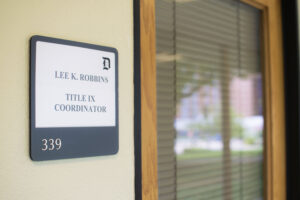
8/27/2020

Kellen Stepler & Kelsey Burtner | editor-in-chief & layout manager
National changes to new Title IX policies have sparked criticism at colleges across the country.
In May, U.S. Department of Education secretary Betsy DeVos announced new federal regulations regarding Title IX, to be implemented on Aug. 14. In a statement from the U.S. Department of Education, the new Title IX regulation “holds schools accountable for failure to respond equitably and promptly to sexual misconduct incidents and ensures a more reliable adjudication process that is fair to all students.”
Vanessa Llewellyn, president of Duquesne’s Students Against Sexual Violence (SASV), said that SASV along with other advocacy groups across the country does not support these new policies and regulations.
“The new definition of what qualifies as sexual harassment discounts so many significant experiences survivors have faced and continue to face,” Llewellyn said. “As president, I will never look a student in the eyes and tell them that what happened to them wasn’t harassment because it doesn’t fit in this new, concise definition of ‘harassment.’”
“It’s intimidating, retraumatizing and creates another obstacle for survivors to overcome in the healing process,” she said.
Duquesne University’s Title IX coordinator Lee Robbins said that the university has implemented a new interim policy, TAP 61. TAP 61 establishes Duquesne’s prohibition against Title IX Sexual Harassment, and Duquesne’s response to allegations of sexual assault that occur off-campus.
Robbins said that many components of the new Title IX process will feel familiar, but some key changes include a new definition of sexual harassment; the opportunity for a complainant or respondent’s advisor to ask questions of the other party or witnesses at a hearing, if one is held; and the option for parties to participate in informal resolution if both parties agree to it.
“Additionally, under the new Title IX Policy, the University will offer supportive measures to complainants and respondents, provide remedies to a complainant where a determination of responsibility has been made against the respondent, and will follow its formal grievance process before the imposition of any disciplinary sanctions or other actions that are not supportive measures against a respondent,” Robbins said.
The university will continue to address non-Title IX sexual misconduct through TAP 31.
Llewellyn is also concerned that the policy permits cross examination of the survivor by the accused student, and said that she sees it as an intimidation tactic to keep assault statistics low.
“This obviously places extreme trauma on the survivor again,” Llewellyn said. “Basically, survivors will recant or not come forward because they don’t want to have to undergo legal cross-examination by the person they’re accusing.”
The current state of the world, Llewellyn said, makes this the worst time to implement these kinds of changes.
“The new policy prohibits the university from holding any reports that don’t occur within a college related program,” she said. “With COVID restrictions in place and almost everything happening remotely or off-campus, it’s likely that even more sexual violence towards our students will occur off campus.”
Duquesne speech pathology major Audrey Nigh believes the new Title IX regulation isn’t inclusive enough.
“There’s several criterion that must be present in order for the school to even get involved,” Nigh said. “These criterion aren’t including a lot of cases that should be taken seriously by the school, such as assaults involving students off campus or abroad.”
Sophia Bakar, a Duquesne graduate student studying biomedical engineering, disagrees with the “fine print” of the regulation — specifically, the cross-examination of both the complaining and responding parties, and that universities can choose to not respond to sexual assault allegations that occur off campus.
“There is a 60 day limit on this process, but in those 60 days it would still be possible for the victim to face further harassment if the situation is escalated or not taken care of,” Bakar said. “Having a live hearing with both parties and witnesses also creates further opportunity for shame and embarrassment of the victim … Duquesne has a large commuter population, and should be just as concerned about the well-being of these students as students residing on campus.”
Students are encouraged to contact the Office of Title IX and Sexual Misconduct Prevention and Response with any questions.

